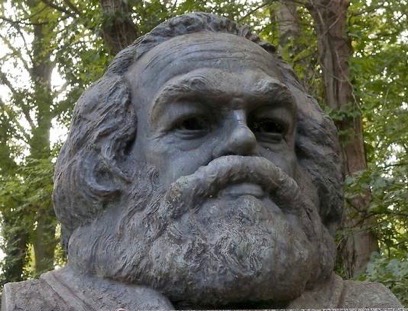
“All that is solid melts into air” – Marx’s famous statement from The Communist Manifesto. The same could be said about what ties meaning to a name; when the real, living, breathing person dies – the name, the word, the signifier becomes free floating, a pure signifier and as Claude Lévi – Strauss stated, the name or signifier becomes “in itself void of meaning and thus apt to receive any meaning.”
In the early 1990’s I remember visiting Highgate cemetery and standing by the grave with my ex-wife and her mother and uncle and raising a glass of champagne to the great man with his thick mane. A hugely imposing bust with the vast body of history behind the iconic image.
However in a new biography, written by Gareth Stedman Jones, professor of the history of ideas at Queen Mary’s University of London entitled Karl Marx: Greatness and Illusion, it would seem that Karl Marx’s true dream and the ideology that bears his name are two very different things. The aim of Stedman Jones’ is to reveal the real Karl and what he was trying to achieve in his work.
Karl Marx was born in 1818 in Trier, now part of Germany. In 1848 the revolutionary upheavals sent him travelling through France, Belgium, Germany and eventually to London where he settled and eventually died in 1883 just a few years before Freud was to establish his theory on the unconscious and the same place where Freud would flee to from Vienna to die 50 years later.
Friedrich Engels was Karl’s closest intellectual collaborator and source of much of the money Marx lived on. After Marx died Engels reinterpreted his work, made Karl’s complicated speculations easier to understand but did some of the meaning also get lost or transformed into something else?
Apparently Engels not only simplified the ideas but he also drew parallels with Darwan. However Marx was not convinced by the theory of natural selection. Marx was much more of an Hegelian in his thinking with his old anti evolutionist motto that “the anatomy of man provides the key to the anatomy of a monkey.” In other words in order to describe the inherent notional structure of a social formation, we must start with the most developed form. A very different approach to that of natural selection.
Perhaps what has been handed down to us is as much Engelism as Marxism?
It would seem that Karl’s attempt to fit the world into his worldview eventually destroyed his health and he began to avoid talking to his well wishers who would only ask him when he would produce more of his ideas and writings.
It would seem from Stedman Jones’ new book that we have to look beyond the myth of “Marxism” and Darwinism and the simplified Marxism of Engelism to know what Karl’s true dream and vision really might have been?